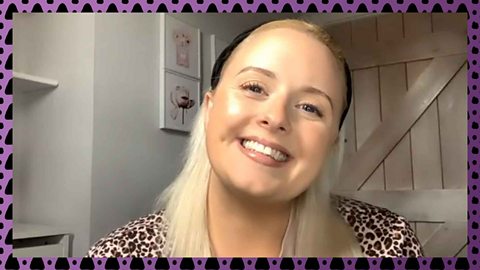This article was first published in October 2021.
If youÔÇÖre having a hard time managing your feelings, itÔÇÖs really important that you talk to someone about it. Sometimes people feel unsure about when to ask for help, how to ask for it, and what kind of help is available. Our short film below will help you understand how you can get some support in a time of need.
If youÔÇÖre having a hard time managing your feelings, itÔÇÖs really important that you talk to someone about it. Sometimes people feel unsure about when to ask for help ÔÇô how to ask for it ÔÇô and what kind of help is available. Here are some questions you might haveÔÇŽ and some answers that will help you:
How do I know if I need to ask for help?If thoughts and feelings are getting in the way of your daily life ÔÇô making it hard to do things, getting in the way of your schoolwork, friendships, family life, eating or sleeping ÔÇô itÔÇÖs a good idea to seek help and support.
Who should I talk to? What types of support are available?There are lots of different types of support available. You can talk to a trusted friend, parent or carer, a member of school staff, or another trusted adult. If you need more support, you can ask staff at your school or your GP and they should be able to tell you where you can get it. You may need to wait a little while for some services, but there are also mental health helplines that you can call to speak to someone right away. ItÔÇÖs ok to try different types of support until one feels right for you.
How do I ask for help? IÔÇÖm not sure I have the right words.It can be hard to put into words how youÔÇÖre feeling. You could start by saying ÔÇśI need some advice on something IÔÇÖm stressed aboutÔÇŽÔÇÖ or ÔÇśI want to tell you something, but I donÔÇÖt know howÔÇŽÔÇÖ
What if I talk to someone and it doesnÔÇÖt help?If you speak to someone and they donÔÇÖt know what to say, or they donÔÇÖt respond the way you expect, try not to be put off. They might not have known what to say right then, but that doesnÔÇÖt mean what youÔÇÖre going through is not important. There are different types of help available ÔÇô you can call a helpline or speak to your GP. It can sometimes take time before you start feeling better so stick with it.
If I ask for some support from a professional, will I be judged? Will my information be kept private?
If you speak to a professional, like your GP or a counsellor they will not judge what you say, remember they are there to help. A counsellor will keep what you say private, unless what you say suggests the safety of you or someone else is at riskÔÇô it is their job is to keep you safe and well.
1. How do I know if I need to ask for help?
Sometimes problems might disappear on their own ÔÇô but sometimes they wonÔÇÖt. If a problem is getting in the way of your daily life in any way: making it hard to do things, for example, getting in the way of schoolwork, friendships, family or interfering with eating and sleeping, then it's a good idea to talk to someone and to get some support.
2. Who should I talk to? What types of support are available?
There are lots of different types of support available. You can talk to a trusted friend, parent or carer, a member of school staff, or another trusted adult. If you need more support, you can ask staff at your school or your GP (doctor) and they should be able to tell you where you can get it. You can ask your parent or carer to help you make an appointment with your GP. You may need to wait a little while for some services, but there are also mental health helplines that you can call to speak to someone right away. ItÔÇÖs ok to try different types of support until one feels right for you.
3. How do I ask for help? I'm not sure I have the right words.
It can be difficult to know what to say to others if you are worried about your mental health. This might especially be the case ifsomeone is feeling ashamed or overwhelmed by the symptoms of their mental health difficulties. But some good ways to start a conversation might be:
- "I want to tell you something, but I don't know how."
- "This is hard for me to say, but I have something important to tell you.ÔÇŁ
- ÔÇťI need some advice on something IÔÇÖm stressed about.ÔÇŁ
- "I'm having a really hard time."
4. What if I talk to someone and it doesn't help?
If you speak to someone and they donÔÇÖt know what to say, or they donÔÇÖt respond the way you expect, try not to be put off. They might not have known what to say right then, but that doesnÔÇÖt mean what youÔÇÖre going through is not important. There are different types of help available ÔÇô you can call a helpline or speak to your GP. It can sometimes take time before you start feeling better so stick with it.
5. If I ask for some support from a professional, will I be judged? Will my information be kept private?
If you speak to a professional, like your GP or a counsellor, they will not judge what you say. Remember they are there to help. A counsellor will keep what you say private, unless what you say suggests the safety of you or someone else is at risk ÔÇô it's their job to keep you safe and well.

If you need support
You should always tell someone about the things youÔÇÖre worried about. You can tell a friend, parent, guardian, teacher, or another trusted adult. If you're struggling with your mental health, going to your GP can be a good place to start to find help. Your GP can let you know what support is available to you, suggest different types of treatment and offer regular check-ups to see how youÔÇÖre doing.
If youÔÇÖre in need of in-the-moment support you can contact , where you can speak to a counsellor. Their lines are open 24 hours a day, 7 days a week.
There are more links to helpful organisations on 91╚╚▒Č Action Line.

The advice in this video and article is based on the findings of the Emerging Minds Co-Ray Project, led at the University of Oxford. You can find out more about the project and get further advice
Feeling bored, flat and unmotivated? Here are some things that can help
Are you feeling bored, flat and unmotivated? Here are some things that can help.

How to support a friend with their mental health
Katie Thistleton with advice from Young Minds on how to support a friend with their mental health.

How to be kinder to people and why it's good for your wellbeing
How can kindness help our wellbeing?
